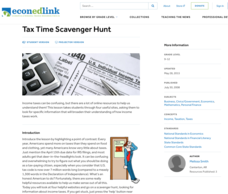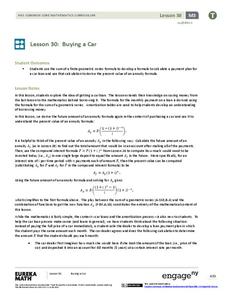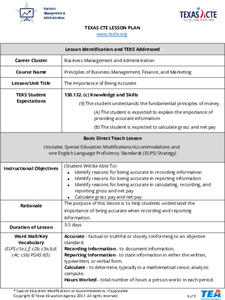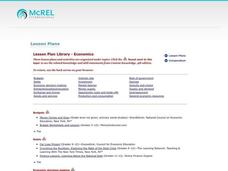Council for Economic Education
China - Where Will They Fit in the World Economy?
Teach scholars why China is so crucial to global economics through an informative resource. Activities include using databases to search for information, watching a video or listening to a podcast, and reading about China's economy as a...
Federal Reserve Bank
Worth!
Before loaning a friend money, what factors would you consider and why would you lend it? Your young economists will face questions like these in a lesson on banking, profit, risk, and reward, which includes the reading of the book...
Council for Economic Education
Tax Time Scavenger Hunt
Is a 1040EZ tax form really easy? Scholars investigate the complexities of the United States taxation system with an economics lesson. Using a wide variety of web sources, they interpret IRS taxation rules and regulations to better...
Council for Economic Education
Sand Art Brownies
Which is better, Coke or Pepsi? Pupils analyze the concept of substitute goods as they investigate the choice to purchase alternate products for better prices. Fun and practical, the engaging shopping exercise helps savvy scholars get...
Council for Economic Education
A Penny Saved
A penny saved is a penny earned! Scholars research the different ways to save money over a lifetime. They investigate the Rule of 72, compound interest, and sub-prime loans to gain an understanding of how banks aid in the saving process....
Practical Money Skills
Using Banking Services
Using a bank is a privilege and a responsibility for young consumers. Teach them the important terms and details about creating accounts, using an ATM, and maintaining a credit card.
Practical Money Skills
Protecting Your Money
How can you tell if a commercial or salesperson is being misleading? Encourage your learners to protect themselves and their money with a lesson about consumer rights. They review laws that keep consumers safe from faulty claims and...
EngageNY
Buying a Car
Future car owners use geometric sums to calculate payments for a car loan in the 31st installment of a 35-part module. These same concepts provide the basis for calculating annuity payments.
EngageNY
Buying a House
There's no place like home. Future home owners investigate the cost of buying a house in the 33rd installment of a 35-part module. They come to realize that the calculations are simply a variation of previous formulas involving car loans...
EngageNY
End-of-Module Assessment Task - Algebra 2 (Module 3)
The last installment of a 35-part series is an assessment task that covers the entire module. It is a summative assessment, giving information on how well pupils understand the concepts in the module.
CK-12 Foundation
Compound Interest per Period: Credit Card Payment
Credit cards can be convenient, but are they worth it? Future consumers learn about compound interest and credit card payments. They use an interactive to create a table that shows the remaining balance after each month.
Beyond Benign
Final Budget
Be sure you have enough money to build a house. The 14th lesson in a 15-part series teaches young learners to use checkbook registers. They write checks for the amounts they spend on various housing materials and keep track of spending...
iCivics
Step 7: Fill the Holes
It's time to communicate without using emojis or hashtags! In the seventh step of a 10-part County Solutions - High School unit scholars analyze professional communication when accomplishing a goal. They use examples, research, and data...
Insurance Zebra
Insurance Curriculum for Middle and High School Teachers
Liability, deductible, premium ... what do these words mean, and how do they relate to insurance? Scholars complete a pre-test, matching vocabulary activity, and insurance timeline worksheet and become familiar with these terms. Next,...
K20 LEARN
Identity Theft: Don't Let This Happen to Your Grandma!
Class members consider how people steal online identities as they discover the essential elements of identity theft and consumer fraud. Pupils demonstrate learning by creating a poster or video about how to avoid identity theft.
US Department of Commerce
Where to Next?
Salary, education, census statistics ... how do people choose their careers? Scholars complete worksheets and rely on census data to determine their career aspirations. Then, pupils conduct Internet research about places they would...
Texas Education Agency (TEA)
Piggy Bank vs. Bank – Choosing and Maintaining Your Account
Cha-ching! Using the practical resource, scholars investigate the different types of bank accounts and banking services available. Pupils view a PowerPoint, practice writing checks, and complete a checking account research project.
Texas Education Agency (TEA)
Importance of Being Accurate
Accuracy is key! Using the detailed resource, scholars practice their presicion skills, taking online spelling and typing tests. Next, they demonstrate accuracy by calculating the gross and net pay of five hypothetical employees.
Nebraska Department of Education
This I Believe
As part of a Career Develop unit, eighth-graders reflect on their beliefs and values and consider how these beliefs might affect their relationships with friends and with colleagues when they join the workforce.
Nebraska Department of Education
Who Am I?
When people look in a mirror, they rarely see themselves as others see them. Tweens and teens can consider the significance of these disparities in a lesson that asks them to reflect on the kind of person they are and how they think...
Curated OER
Scarcity, Choice and Decisions
Students study the basic economic trilogy (scarcity, choice, and costs). In this money management lesson, students use a scenario of a High School Prom to calculate how scarcity, choice and cost apply by completing provided worksheets...
Curated OER
Micro Economics - Personal Budgeting
Students explore the real world as it relates to money and how people use it. In this money management lesson, students jump into the real world as they role play with money through spending, saving, being married, single, having...
Curated OER
Savings Accounts and Interest
First graders study money, banks, and getting interest on money. In this consumer math lesson, 1st graders listen to Stan and Jan Berenstain's, Berenstain Bears' Trouble With Money. They use the concepts in the book to discuss...
Curated OER
Labor, Choice, and Sales Tax
Students consider the idea of earning and spending money. In this money management lesson plan, students discuss the concept of saving and spending money through the reading of a story and by completing several activities that involve...
Other popular searches
- Math Money Management
- Money Management for Teens
- Money Management for Kids
- Esl Money Management
- Classroom Money Management
- High School Money Management
- Finance and Money Management
- Money Management Ell
- Esl Grammar Money Management
- Personal Finance for Teens
- Business Finances
- Finances and Parenting

























